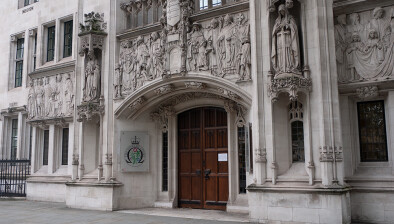High Court: No basis for amending birth or marriage certificates to reflect new identities under witness security programme

The High Court has determined that a family participating in the State’s witness security programme (WSP) are not entitled to obtain amended birth certificates or marriage certificates to reflect their new identities.

About this case:
- Citation:[2024] IEHC 115
- Judgment:
- Court:High Court
- Judge:Mr Justice Rory Mulcahy
Delivering judgment for the High Court, Mr Justice Rory Mulcahy opined that “it would be disproportionate to insist that the State amend its system of registration of births and marriages in order to reduce the level of any interference with the plaintiffs’ constitutional rights necessitated by their participation in the WSP”, but that this “should not be taken as a discouragement to the State to place [the WSP] on a statutory basis”.
Background
The plaintiffs were residing outside of the State as part of the WSP due to threats from gang members, and were given new identities. The plaintiffs alleged that due to their original names appearing on their birth certificates and marriage certificate, they experienced certain difficulties in their host jurisdiction.
The plaintiffs inter alia claimed that the failure of the State to provide them with birth certificates in their new names and a new marriage certificate in the new names of the first and second plaintiffs was in breach of their rights under Articles 40.1, 40.3.1° and/or 40.3.2°, and/or 41 and/or 42A of the Constitution, and constituted a breach of the State’s obligations under the European Convention on Human Rights (ECHR) and the Charter of Fundamental Rights of the European Union (CFREU).
The plaintiffs contended that a constitutional right to a new birth or marriage certificate existed when certain “essential features” were present — where a person is required to assume a new name due to an indefinite risk to their life if they use their original name, where the risk arises from the provision of assistance to the state in a matter of public interest, and where the person is coerced by that risk to live under the new name as part of a State-sanctioned regime for witness protection.
The High Court
Mr Justice Mulcahy considered the system of registration for births and marriages in Ireland provided by Civil Registration Act 2004, noting section 63 which provides for the correction of clerical errors or errors of fact by persons “having an interest in the matter”.
The court highlighted that an entry “can only be amended or altered if it contains a clerical error or an error of fact, i.e., there is no provision for amendment to reflect a subsequent change in circumstances… Regulations may be made to allow for the correction of errors, but there is no enabling provision providing for amendments to reflect subsequent changes.”
Recognising that “the plaintiffs may never be able to live and operate in the host jurisdiction completely independent of the WSP, irrespective of whether they have new certificates”, the court pointed out: “The evidence does not support an argument that the absence of new certificates imperils the protection afforded to the plaintiffs by their participation in the WSP, and no such claim was advanced by the plaintiffs.”
Mr Justice Mulcahy considered that the plaintiffs had not identified any lacuna in the 2004 Act which breached their constitutional rights, finding that there is “a fundamental difference between a right to have one’s identity correctly recorded — which is protected by the Constitution — and a right to have a particular record reflect a change in identity effected after that record was made”.
The judge opined that insofar as the plaintiffs asserted that birth certificates are documents “core to their identity”, they were making birth certificates into something which they are not. “A birth certificate is a historical record, not an identity document, albeit that it is clear from the case law that having an accurate record is fundamental to one’s identity and, therefore, personhood,” he said.
Mr Justice Mulcahy opined: “It seems to me that some of the difficulties which arose in the plaintiffs’ case might have been avoided if the WSP here was on a statutory basis and there was more visibility about what the program involved. The defendants’ garda witness accepted that a legislative scheme which allowed for new certificates would be beneficial.”
Finding that “what the plaintiffs assert is an entitlement to an inaccurate record”, the court distinguished their position from that in the cases of Caldaras v An tArd Chláiritheoir [2013] 3 IR 310 and Habte v Minister for Justice and Equality [2020] IECA 22, in which the official record contained errors which the State refused to correct.
The court could not see how an inaccurate record, “no matter how beneficial”, could be necessary to vindicate the plaintiffs’ personhood, and whilst expressing sympathy for the second plaintiff in that she had to lie about the reason for having no birth certificates for her children, the judge pointed out that “the stark reality is that the plaintiffs’ participation in the WSP means they must necessarily maintain a fabricated history or ‘legend’… that does not in my view, elevate the plaintiffs’ desire for new certificates, which might reduce the circumstances in which a lie might be required, to a constitutional imperative that those new certificates be provided”.
Mr Justice Mulcahy expressed that “it would be disproportionate to insist that the State amend its system of registration of births and marriages in order to reduce the level of any interference with the plaintiffs’ constitutional rights necessitated by their participation in the WSP. That should not be taken as a discouragement to the State to place its witness protection program on a statutory basis”.
Finding that the case law regarding the recognition of transgender persons relied upon by the plaintiffs was not even “remotely analogous” to their position, the court was satisfied that no entitlement to a declaration as to their rights under the ECHR was established. The court also determined that very similar arguments were advanced in relation to the CFREU, and rejected that claim.
Mr Justice Mulcahy concluded that the 2004 Act did not fail to vindicate the plaintiffs’ rights and even if there was an interference with their rights, having regard to the circumstances of the interference and the positive steps taken by the defendants to protect the plaintiffs’ lives and personhood, and having regard to the legitimate aim of the State in maintaining the registers created pursuant to the 2004 Act as historical records, any such interference would be regarded as proportionate to that aim.
Conclusion
Accordingly, the court dismissed the plaintiffs’ claim.
Doe & Ors v. Commissioner of An Garda Siochána & Ors [2024] IEHC 115










